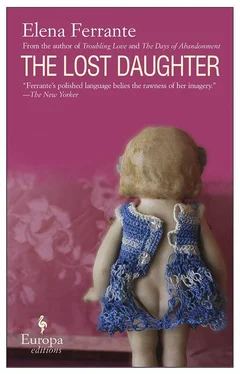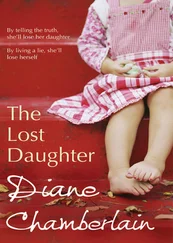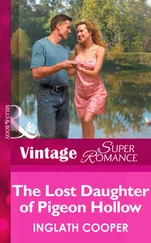I withdrew, returned to the umbrella, began to gather up my things, even though it wasn’t even two in the afternoon. I didn’t like it that Elena was still crying. I saw that the group was celebrating her, the women took her from her mother and passed her around to try to quiet her, but without success, the child was inconsolable.
Nina came over to me. Immediately afterward Rosaria also arrived, she seemed proud of having been the first to establish a relationship with me, who had been so decisive.
“I wanted to thank you,” said Nina.
“It was a good scare.”
“I thought I would die.”
“My daughter got lost on a Sunday in August, almost twenty years ago, but I couldn’t see anything—anguish is blinding. In this situation strangers are more useful.”
“Luckily you were there,” Rosaria said. “So many bad things happen.” Then evidently her gaze fell on my back, because she exclaimed with a gesture of horror, “My goodness, what happened here, to your back, what was it?”
“A pinecone, in the woods.”
“It looks painful—did you put something on it?”
She wanted to go and get an ointment she had, she said it was miraculous. Nina and I remained alone; the cries of the child reached us insistently.
“She won’t calm down,” I said.
Nina smiled.
“It’s a bad day: we found her and she lost her doll.”
“You’ll find it.”
“Of course, if we don’t find her, what will we do—she’ll get sick.”
I felt a sudden sensation of cold on my back, Rosaria had come up behind me silently and was spreading her cream.
“How is it?”
“Good, thank you.”
She continued, attentively. When she had finished, I put my dress on over my bathing suit, picked up my bag.
“Until tomorrow,” I said. I was in a hurry to get away.
“You’ll see, already by tonight it’ll feel better.”
“Yes.”
I looked again at Elena, who was wriggling and writhing in her father’s arms, calling alternately for her mother and the doll.
“Let’s go,” Rosaria said to her sister-in-law, “let’s find the doll, because I can’t stand hearing her scream anymore.”
Nina gave me a nod of farewell, went off to her daughter. Rosaria instead began immediately to ask children and parents, searching meanwhile, without permission, among the toys piled under the umbrellas.
I went back up over the dunes, and into the pinewood, but even there I seemed to hear the child’s cries. I was confused, placed a hand on my chest to calm my racing heart. I had taken the doll, she was in my bag.
As I drove home I grew calmer. I discovered that I couldn’t recall the exact moment of an action that I now considered almost comic, comic because senseless. I felt like someone at the moment of realizing, perhaps with fear, perhaps with amusement: look what happened to me.
I must have had one of those waves of compassion that, from the time I was a child, have engulfed me, with no obvious reason, for people, animals, plants, things. I liked the explanation; it seemed to allude to something intrinsically noble. It had been a spontaneous impulse to help, I thought. Nena, Nani, Nennella, or whatever her name was. I saw her abandoned in the sand, limbs askew, her face half buried, as if she were about to suffocate, and I picked her up. An infantile reaction, nothing special, we never really grow up. I decided that I would give her back the next day. I’ll go to the beach very early, I’ll stick her in the sand just where Elena left her, I’ll do it in such a way that she’ll find the doll herself. I’ll play with the child a little and then say, look, she’s here, let’s dig. I felt almost happy.
At home I took bathing suits and towels and lotions out of my bag, but I left the doll in the bottom, to be sure, the next day, not to forget her. I took a shower, washed my bathing suits, hung them out to dry. I also made a salad and ate it on the terrace, looking at the sea, at the foam around the tongues of lava, at the array of black clouds leaving the horizon. Then suddenly it seemed to me I had done something mean, unintentional but mean. A gesture like one you make in sleep, when you turn over in bed and upset the lamp on the night table. Compassion doesn’t have anything to do with it, I thought, there was no question of a generous feeling. I felt like a drop that slides over a leaf after the rain, carried along by a clearly inevitable movement. Now I’m trying to find excuses, but there are none. I feel confused, the months of lightness are already gone, perhaps; I’m afraid that racing thoughts and whirling images are returning. The sea is becoming a violet band, the wind has come up. How changeable the weather is, the temperature has fallen abruptly. On the beach Elena must still be crying, Nina is desperate, Rosaria has combed the sand, inch by inch, the clan must be at war with all the other beachgoers by now. A paper napkin flew away, I cleared the table; and for the first time in many months I felt alone. I saw in the distance, on the sea, curtains of dark rain falling from the clouds.
In the space of a few minutes the wind had gained strength, moaning as it whipped against the building and blowing dust, dry leaves, dead insects into the house. I closed the door to the terrace, took the bag, sat down on the small sofa in front of the window. I couldn’t even hold on to my intentions. I fished out the doll, turned her in bewilderment between my hands. No clothes, who knows where Elena had left them. She was heavier than I expected, she must be full of water. Her sparse blond hair stuck out of her head in widely scattered tufts. Her cheeks were too puffy, she had stupid blue eyes and small lips with a dark opening at the center. Her chest was long, her stomach protruding; between short fat legs one could just make out a vertical line that continued without a break between broad buttocks.
I would have liked to dress her. I had the idea of buying her some clothes as a surprise for Elena, a kind of reparation. What is a doll to a child. I had had one with beautiful curly hair, I had taken great care of her, had never lost her. Her name was Mina, my mother said that I had given her the name. Mina, mammina. Mammuccia came to mind, a word for “doll” that hasn’t been used for a long time. Play with the mammuccia . My mother had rarely yielded to the games I tried to play with her body. She immediately got nervous, she didn’t like being the doll. She laughed, pulled away, grew angry. It annoyed her when I combed her hair, put ribbons in it, washed her face and ears, undressed her, redressed her.
I, on the other hand, no. As an adult I tried to keep in mind the misery of not being able to handle the hair, the face, the body of my mother. So when Bianca was a small child I patiently became her doll. She dragged me under the kitchen table, it was our playhouse, and made me lie down. I was very tired, I remember: Marta wouldn’t sleep at night, only during the day, and then only a little, and Bianca was always around me, full of demands, she didn’t want to go to day care; when I did manage to leave her there she got sick, complicating my existence even further. Yet I tried to keep my nerves under control, I wanted to be a good mother. I lay on the floor, let myself be cared for as if I were sick. Bianca gave me medicine, brushed my teeth, combed my hair. Sometimes I fell asleep, but she was little and didn’t know how to use the comb, and when she pulled my hair I started, and woke. I felt my eyes tearing with pain.
I was so desolate in those years. I could no longer study, I played without joy, my body felt inanimate, without desires. When Marta began to howl in the other room it was almost a liberation. I got up, rudely cutting off Bianca’s game, but I felt innocent, it wasn’t I who was leaving my daughter, it was my second-born who was tearing me away from the first. I have to go to Marta, I’ll be right back, wait. She would begin crying.
Читать дальше












